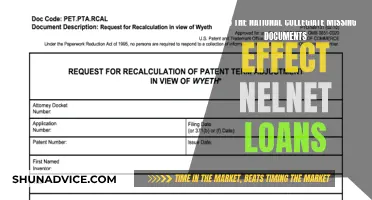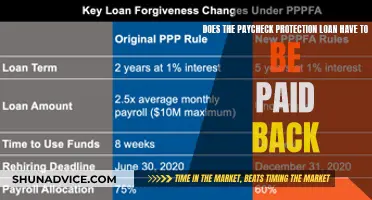
Taking out a loan is a great way to fulfill financial aspirations, but it's important to know how to lower the total cost, both before and after you borrow. The total loan cost is determined by the loan amount, interest rate, and term length. While a shorter loan term can reduce the total cost, it also means higher monthly payments. On the other hand, a longer loan term means lower monthly payments but a higher total interest cost. To reduce costs, it's advisable to shop around for loans with lower interest rates and to pay off the loan as quickly as possible. Additionally, making extra payments, paying on time, and consolidating debt can also help lower the total loan cost.
What You'll Learn

Opt for shorter loan terms
Opting for shorter loan terms can be an effective way to reduce the total cost of your loan. When you choose a shorter-term loan, you commit to paying off your loan in less time. This results in higher monthly payments but also means you're borrowing money for a shorter period, reducing the amount of interest you'll pay over the life of the loan.
Interest is calculated on an annual basis; thus, the longer you borrow, the more you end up paying. For example, a $10,000 loan at a 5% annual interest rate will cost you $12,728 in total if you take 10 years to pay it off. However, if you choose to pay it off in 5 years, despite higher monthly payments, your total repayment will be $11,322. That's a difference of $1,406, money you could invest towards your other financial goals.
Lenders are more willing to offer lower rates for shorter-term loans as the repayment period is shorter, reducing their risk. For example, a 30-year mortgage loan might come with a 4% interest rate, while a 15-year loan might offer a 3.5% rate. Over time, the borrower with the shorter term pays significantly less in interest.
While shorter loan terms save you money in the long run, they do demand higher monthly payments, which may strain your budget. It's essential to balance the affordability of these payments with your overall financial situation. If shorter loan terms create financial stress or threaten your ability to meet other necessary expenses, a longer term with lower monthly payments might be a better fit. Ultimately, the key is to choose a loan term that aligns with your financial capabilities and goals.
Before deciding to pay off your loan early, it's important to check your loan terms to make sure you won't get hit with any fees or prepayment penalties for doing so.
Bluewave Loans: A Comprehensive Overview
You may want to see also

Focus on high-interest loans
The total loan cost is the amount you pay over the life of the loan, including the amount borrowed (the principal), added interest, and fees. The interest rate is a portion of the loan repayment amount paid to the lender as an incentive for borrowing money. It is typically expressed as a percentage of the amount borrowed and is paid in addition to the principal amount. The interest rate is what makes borrowing money expensive or cheap.
High interest rates can have a big impact on your total loan costs. Therefore, it is important to focus on paying off loans with higher interest rates first. This will help you save money on accrued interest and reduce your repayment timeline. Here are some strategies to help you reduce your total loan cost by focusing on high-interest loans:
- Refinancing: Refinancing your loan can help you get a lower interest rate. However, consider any upfront fees associated with refinancing, such as origination or application fees. Use a refinance calculator to estimate your total loan costs for different rates and terms.
- Federal consolidation: If you have federal student loans, you can consolidate them into a single payment. This takes the aggregate average of all your interest rates to give you a new rate, which could lower your total loan cost. However, once your federal loans become private through refinancing, you may lose access to federal relief programs such as student loan forgiveness or income-driven repayment plans.
- Income-driven repayment plans: Enrolling in an income-driven repayment plan can make your monthly payments more manageable. The federal government offers these plans for federal loans, and they may even offer loan forgiveness after a certain period.
- Public service loan forgiveness: If you work for the federal government or a qualifying non-profit organization, you may be eligible for public service loan forgiveness.
- Paying early and extra: If you can, start paying off your loans early and pay a little extra. The more you pay early on, the less interest will be added to your loan later. Making extra payments when you have additional funds, such as from a bonus or tax refund, can help you save money by reducing the total interest you pay.
- Bi-weekly payments: Instead of making one monthly payment, switch to bi-weekly payments. This will result in an extra month's payment each year, helping you reduce your principal balance faster and lower your total interest costs.
- Rounding up payments: An easy way to make more student loan payments is to round up your payments to the nearest $50. This small amount can add up over time and help you pay off your loan faster.
- Avoid late payments: Late loan payments can increase your total loan cost. Some loans charge higher interest or extra fees for missed payments.
- Improve your credit score: Lenders use your credit score to determine the interest rate they will offer you. A higher credit score can help you qualify for a lower interest rate.
Canceling a Withu Loan: A Step-by-Step Guide to Navigate This Process
You may want to see also

Make early payments
Making early payments on your loan is a great way to reduce your total loan cost. The faster you repay a loan, the less interest you pay overall. Here are some strategies to help you make early payments:
Start Paying Sooner
If you have student loans, consider starting a repayment plan while you are still in school. Many loans do not start collecting interest until after graduation, so making even small payments while in school can reduce your total loan cost. The longer you can pay before graduation, the lower your total loan amount will be.
Make Extra Payments
Making extra payments is a great way to pay off your loan faster. You can do this by paying more frequently (e.g. bi-weekly instead of monthly) or by paying more than the minimum amount when you can afford to. Some lenders may allow you to make extra payments without paying an extra fee, so be sure to check with your lender. You can use windfalls like tax refunds or bonuses to make extra payments, or you can take on a side hustle to boost your income.
Focus on High-Interest Loans First
If you have multiple loans, focus on paying off the ones with the highest interest rates first. This will save you money on accrued interest and reduce your repayment timeline.
Refinance Your Loan
Refinancing your loan to a lower interest rate can help you save on interest and get out of debt faster. However, be sure to consider any upfront fees associated with refinancing, as well as the potential impact on your credit score.
Pick a Shorter Loan Term
Loans with shorter terms often come with lower interest rates than longer-term loans. This is because lenders assume that a shorter term means you're more likely to repay the loan on time. While your monthly payments may be higher, you will pay off the loan faster and save on interest.
Remember to consider your financial situation and budget before making early payments. It's important to have savings set aside for emergencies and to ensure that making early payments won't put a strain on your regular spending.
Seller's Role in FHA Loan Process: What to Know?
You may want to see also

Avoid unnecessary fees
When it comes to loans, unnecessary fees can be a burden. Here are some ways to avoid them:
Firstly, it is important to understand the different types of fees that can be incurred. Application fees, for example, are charged by some lenders just for submitting a loan application. These can often be avoided by simply choosing a lender that does not charge such fees. Similarly, origination, processing, and underwriting fees are common with mortgages and can add up quickly. Lender fees can sometimes be negotiated or waived entirely, so it is worth discussing this with your lender.
Another common fee is the prepayment penalty. This is charged by some lenders if you pay off your loan early or make additional payments to reduce the principal. To avoid this, carefully read the fine print on your loan agreement to understand if and when this fee might be applied. If you plan to pay off your loan early, choosing a lender that does not charge prepayment penalties is a good option.
Late fees are another unnecessary cost that can be easily avoided. Making timely payments will ensure you do not incur these extra charges. Set up automatic payments or reminders to ensure you never miss a due date. Additionally, ensure you have sufficient funds in your account to cover the payments by maintaining a buffer amount to account for any unexpected expenses. This will help you avoid bounced check fees and overdraft charges.
Finally, consider the interest rate on your loan. While not exactly a fee, a high-interest rate will significantly increase the total cost of your loan over time. Focus on paying off loans with higher interest rates first, and consider refinancing to get a lower rate if possible.
By being mindful of these potential fees and taking proactive steps, you can significantly reduce the overall cost of your loan.
Understanding THDA Loans: Home-buying Assistance in Tennessee
You may want to see also

Improve your credit score
Improving your credit score is one of the most effective ways to reduce the total cost of a loan. Your credit score is a snapshot of how you manage debt, and it is one of the most important measures of your financial health. It tells lenders how likely you are to repay new debt and how responsibly you use credit. The better your score, the more likely you are to be approved for new loans or lines of credit and to secure lower interest rates.
- Check your credit score and credit report: Review your credit score to understand where you stand. You can use free credit monitoring services to monitor your credit report and score. You are entitled to free weekly reports from each of the three major credit bureaus (Equifax, Experian, and TransUnion). Checking your credit report will also allow you to identify and dispute any errors or inaccuracies.
- Improve your payment history: Payment history is one of the most important factors influencing your credit score, accounting for 35% of a FICO score. Make sure to pay all your bills and debts on time, every time. You can set up automatic payments or mobile alerts to help you stay on top of due dates.
- Reduce your credit card balances: Pay down your credit card balances to keep your overall credit utilization low. This will help improve your credit mix, which accounts for 10% of your FICO score.
- Keep old credit accounts open: The length of your credit history also influences your credit score, so it's a good idea to keep old credit accounts open, especially if they are one of your oldest tradelines. Consider using your oldest credit card for small, recurring purchases that you pay off in full and on time.
- Get an additional credit account: An additional credit account in good standing may help your credit, especially if it is a type of credit you don't already have. For example, if you only have loans or few credit cards, consider getting a new credit card. However, weigh the potential benefits against the time and cost of interest and fees.
- Consider a debt consolidation loan: If you have multiple outstanding debts, you can take out a debt consolidation loan to pay them all off. This will leave you with a single payment to manage, and if you can get a lower interest rate, you can pay down your debt faster and improve your credit score.
Remember, improving your credit score takes time and consistency, but it is a crucial step toward financial health and independence.
Understanding Loan References: What They Are and Why They Matter
You may want to see also
Frequently asked questions
There are several ways to reduce the total cost of your loan. Firstly, you could opt for a shorter loan term. Shorter loan terms often come with lower interest rates as lenders assume that you are more likely to repay the loan on time. While this results in higher monthly payments, it reduces the amount of interest you pay over time.
You can make extra payments when you can. For example, if you receive a bonus or tax refund, consider putting a portion of it towards your loan. Making an additional lump-sum payment can help lower the total cost of your loan.
Yes, you can switch to bi-weekly payments instead of monthly payments. By doing so, you will make an extra month's payment each year, reducing your principal balance faster and lowering your total interest costs.
You can shop around for a loan with a lower interest rate. Interest rates can significantly impact your total loan costs, so it is important to compare different lenders to find the best rates and lowest fees.
Yes, it is important to be mindful of potential risks. For example, refinancing your loan may come with fees such as origination or prepayment penalties. Additionally, extending your loan term to lower your monthly payments may result in paying more interest overall, even if your interest rate is lower.







